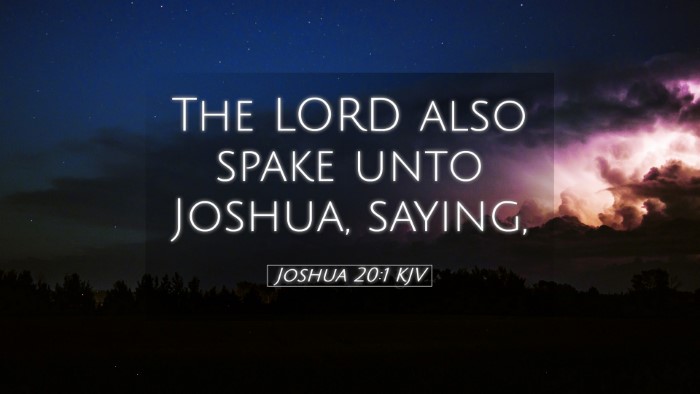Old Testament
Genesis Exodus Leviticus Numbers Deuteronomy Joshua Judges Ruth 1 Samuel 2 Samuel 1 Kings 2 Kings 1 Chronicles 2 Chronicles Ezra Nehemiah Esther Job Psalms Proverbs Ecclesiastes Song of Solomon Isaiah Jeremiah Lamentations Ezekiel Daniel Hosea Joel Amos Obadiah Jonah Micah Nahum Habakkuk Zephaniah Haggai Zechariah MalachiJoshua 20:1
Joshua 20:1 KJV
The LORD also spake unto Joshua, saying,
Joshua 20:1 Bible Commentary
Commentary on Joshua 20:1
In the book of Joshua, chapter 20 verse 1, we find a significant moment in the establishment of justice and refuge in ancient Israel: "The Lord also spoke to Joshua, saying." This verse serves as an introduction to God's divine instruction regarding the cities of refuge, which are essential for understanding the theme of mercy and protection in the plan of salvation.
Context and Background
The context of Joshua 20 is pivotal in understanding its application and implications. Following the conquest of Canaan, God commands Joshua to set apart cities that would serve as cities of refuge. These cities allow individuals accused of manslaughter a safe haven from avengers, signifying God's provision for justice and mercy.
God's Sovereign Initiative
The phrase "The Lord also spoke to Joshua" underscores the principle of divine guidance. As emphasized in Matthew Henry’s Commentary, it is essential to recognize that God takes the initiative in providing a system for His people. This reflects His ongoing commitment to justice:
- Divine Commands: God's instructions are sovereign and aimed at the welfare of His people.
- Providential Care: The establishment has the intention of protecting life and providing refuge.
The Concept of Cities of Refuge
As we look further into this practice of establishing cities of refuge, we see several key themes highlighted in Albert Barnes' Notes on the Old Testament:
- Protection: These cities served to protect those who may have committed unintentional manslaughter from the avenger of blood.
- Justice: It underscores the need for justice, as it prevents the cycle of vindictive retribution.
- Mercy: It reflects God's mercy in allowing a path for forgiveness and rehabilitation.
God’s Justice and Mercy in Balance
The balance between justice and mercy is a recurring theme in Scripture. In reference to these cities, Adam Clarke articulates that they symbolize the broader theological concepts of atonement and the provision God offers through Christ — our ultimate refuge. This allows us to delve into deeper theological implications:
- Typology of Christ: Just as these cities offered refuge, Christ reflects the ultimate city of refuge for believers.
- Consequences of Sin: While mercy is extended, justice must also be addressed, which is vital in Yahweh's governance.
The Importance for Today’s Believers
The implications of Joshua 20:1 extend well into the New Testament and beyond, having practical applications for today’s believers:
- Refuge in Christ: Believing in Him provides ultimate safety from spiritual death due to sin.
- Responsibility of the Community: Just as God commanded these cities to be established, today’s church is called to create an environment of support for those seeking refuge.
Lessons for Pastors and Leaders
For pastors and leaders, this scripture holds vital lessons regarding leadership and the dispensation of justice:
- Guidance through Prayer: It is essential to seek God’s guidance in administering justice within the community.
- Empathy and Understanding: Leaders are urged to demonstrate compassion and offer support to those who might feel ostracized.
- Community Restoration: Fostering a spirit of restoration rather than retribution aligns with the heart of God.
Conclusion
In conclusion, Joshua 20:1 calls both individual believers and church leaders to embrace the dual concepts of justice and mercy, reflecting God's heart for humanity. It emphasizes the continued relevance of God's provisions and teachings throughout history and showcases the unchanging nature of His character. As we delve deeper into the Word, may we continually seek understanding of His paths and His ways, shining forth His light in our communities.


